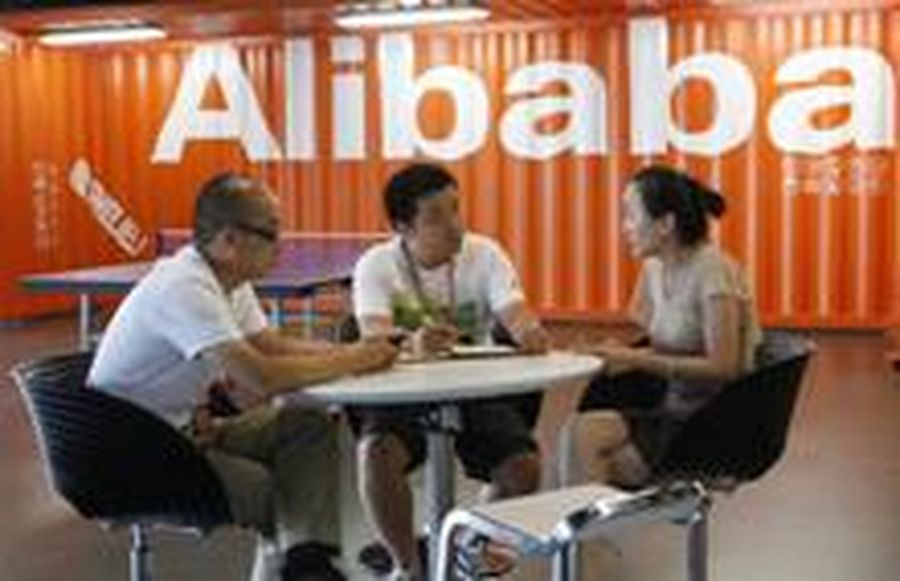
Source: Reuters/Steven Shi
Employees hold a meeting inside the headquarters office of Alibaba (China) Technology Co. Ltd on the outskirts of Hangzhou
The Chinese e-commerce giant is already working on a private share placement, a preferred stock issue, a US$3bn syndicated loan and the privatisation of Hong Kong-listed Alibaba.com. Further down the line is the IPO of the parent company – a listing that promises to smash records for Asia’s technology sector.
The deal provides Yahoo with a staged exit from its investment in Alibaba and frees the Chinese to pursue its own growth strategy following the souring of the relationship between the two partners in recent years. Yahoo bought the 40% stake for US$1bn in October 2005.
The broader reorganisation, including the delisting of wholesale marketplace Alibaba.com, also paves the way for a jumbo IPO of the Alibaba Group.
The Alibaba Group generated 2011 Ebitda of US$965m and analysts are already talking of a jumbo valuation for the stock when it does list. A group listing will give investors access to Taobao, China’s biggest online auction and shopping site, which contributed more than 60% of Alibaba’s Ebitda last year.
The timing of the IPO remains unclear, but Yahoo has committed to sell at least a quarter of its remaining stake in the float. That lockup expires in December 2015, suggesting that both parties are looking to push ahead with the listing as soon as possible.
Before any of that can happen, Alibaba needs to fund the Yahoo buyback.
It will issue US$800m of preferred stock to its US partner and use up to US$1.5bn from the syndicated loan. The balance of the US$7.1bn consideration will come from share placements and Alibaba’s own cash reserves (currently at US$1.7bn), which will need to be unlocked from its onshore Chinese operating units. Bankers said this could come through a combination of offshore loans from PRC lenders (with onshore cash deposits of the group as collateral) and inter-company loans.
Alibaba has to raise at least US$2bn from the private share placements and is already said to be in advanced discussions on the matter with several parties, including new investors and existing shareholders.
Among the likely new investors is China Investment Corp, which is considering a significant investment of up to US$2bn.
Other private-equity firms, such as Bain Capital, Blackstone Group and Hony Capital, are also in talks with Alibaba for equity stakes.
Alibaba is also in discussions with existing shareholders, including Singapore’s Temasek Holdings, for an additional US$2.3bn in equity raising.
Last November, a consortium comprising Temasek, Russian billionaire Yuri Milner’s Digital Sky Technologies (also known as DST Global), PE firm Silver Lake Partners and Yunfeng Capital (under the control of Alibaba founder Jack Ma) bought a combined 5% stake in Alibaba for US$1.6bn.
Valuation incentives
The Yahoo buyback leaves the US internet firm with a 20% stake, and its pro-forma ownership will rise to about 23% on completion of the third-party placements and preferred stock issues. Yahoo’s divestment values Alibaba at around US$35bn. Both partners, however, have incentives to drive for a higher valuation under the terms of the deal.
For instance, assuming Alibaba sells shares to third parties at a US$40bn valuation, it will still need to pay Yahoo only US$7.1bn for the buyback. In other words, Alibaba gets a 12.5% incentive discount for selling the 523m shares. If Alibaba achieves a valuation of as much as US$50bn, it pays Yahoo a maximum of US$8.1bn, with the maximum incentive discount at 20%.
While Yahoo will get paid more for a higher valuation, it also stands to gain from the higher value of its remaining stake.
Alibaba is also required to make an upfront royalty payment to Yahoo of US$550m plus four additional years of royalty. The next four payments are expected to be similar to the US$50m paid in 2011.
Those royalty payments cease when Alibaba lists, again incentivising the group’s IPO.
The US$800m in preferred stock, which Alibaba will issue to Yahoo as part of the consideration payable, carries a 10% dividend rate. At least 3% is payable in cash, which adds at least US$24m annually to the group’s financing costs. The remainder accrues and is added to the face amount. The dividend rate can decline below 10%, depending on Alibaba’s credit rating.
The preferred shares are redeemable after 10 years. Redemption is also accelerated by one year for each percentage point decline in the dividend rate below 10%. The preferred shares are also callable at any time at principal plus accrued dividends.
The preferred shares have protective provisions for Yahoo, such as acceleration after non-payment of dividend or upon bankruptcy. The preferred shares are freely transferable by Yahoo after 18 months.
Role on IPO
At the time of the IPO, Alibaba will be required to repurchase a quarter of Yahoo’s current stake at the IPO price or allow the US internet giant to sell those shares in the float. There is no specific commitment to IPO timing, but Yahoo’s obligation to retain shares to sell in the float expires in December 2015.
Yahoo will have the right, but no obligation, to sell its remaining stake with Alibaba Group marketing support after the IPO.
The US firm will also have a say in the selection of underwriters on the IPO. This puts the advisers to both firms in pole position for prominent roles on the coveted listing.
UBS is lead financial adviser to Yahoo, while Allen & Co and Goldman Sachs are financial advisers. Credit Suisse is lead financial adviser to Alibaba.
(Additional reporting by Denny Thomas, Stephen Aldred and Saeed Azhar)
